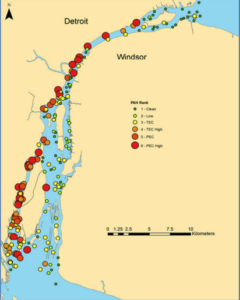
 The 2023 State of the Strait Report calls for “urgency” in cleaning up toxic sediment on the bottom of the Detroit River. Remediation is needed on the Detroit side but not on the Canadian side, according to the report.
The 2023 State of the Strait Report calls for “urgency” in cleaning up toxic sediment on the bottom of the Detroit River. Remediation is needed on the Detroit side but not on the Canadian side, according to the report.
Jon Allan, senior academic and research program officer at the University of Michigan School for Environment and Sustainability co-authored the report with Casey Godwin, assistant research scientist at the Center for Cooperative Great Lakes Research at SEAS. Godwin also was the co-chair of the State of the Strait conference steering committee.
Contaminated sediments continue to limit the ecological recovery of the Detroit and Rouge River ecosystems. In the Detroit River, contaminated sediments on the U.S. side have been targeted for remediation by state and federal governments. In the Rouge River, scientists are determining just how much contaminated sediment will require remediation.
The good news is that the Great Lakes Legacy Act will provide 65% of the funding through federal dollars, with local nonfederal partners providing the 35% match funding. Experience has shown that cleanup will result in a healthier ecosystem for both wildlife and humans.
Efforts should also be made to ensure that ecosystem restoration improves the lives of people living in the watershed. Control of contaminants at their source through pollution prevention remains the primary imperative for action. Experience has shown that pollution prevention is much more ecologically sound and cost-effective than contaminated sediment remediation.
The State of the Strait is a Canada-United States collaboration that hosts a meeting every two years to bring together government managers, researchers, students, environmental and conservation organizations, and concerned citizens. Participants work to understand historical ecosystem conditions and assess current ecosystem status to achieve a better future for the Detroit River and western Lake Erie.

